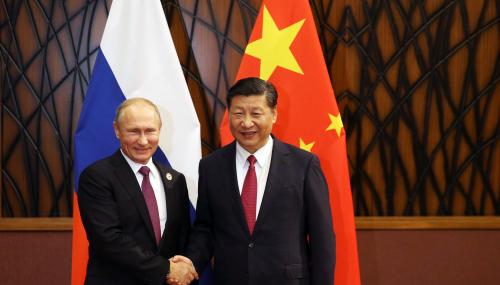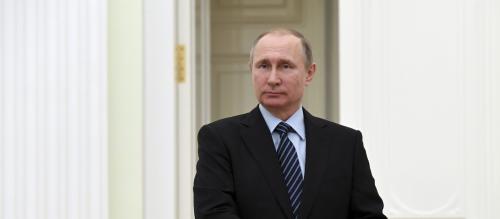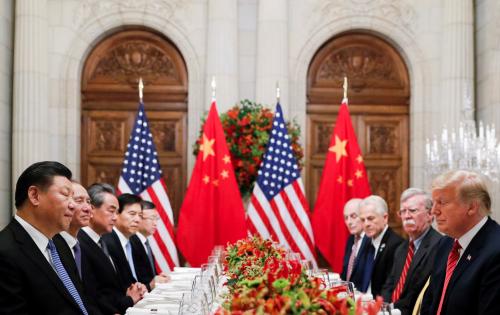Torrey Taussig writes that from Ankara to Beijing to Moscow, the world’s powerful autocrats are consolidating personalized control with no clear succession plan—a trend that portends greater internal and international volatility. This piece originally appeared in The American Interest on March 14, 2018.
While Russians have yet to cast their votes in the March 18 presidential election, Vladimir Putin’s victory is already a foregone conclusion. Putin, with near certainty, will prove both his critics and supporters right by winning an essentially uncontested election that will keep him in the Kremlin for another six years. With consistent approval ratings of over 80 percent and no viable political opposition, the election will confirm Putin’s hold on Russia’s political system, which he has dominated for 18 years. His impending victory will also cap a series of political shifts across some of the world’s most geopolitically consequential states, in which autocrats are tightening their control to the detriment of internal and international stability. Despite President Trump’s affinity for strongman rulers, these dynamics should cause concern within the administration.
Putin is one of several autocrats demonstrating that he has little interest in loosening his grip on power. In a near-unanimous vote this week, the Chinese National People’s Congress approved a constitutional amendment to remove presidential term limits, essentially paving the way for Xi Jinping to stay in power indefinitely, if he chooses. This move was foreshadowed at the Communist Party Congress in October, when “Xi Jinping Thought” was enshrined in China’s constitution. Xi also broke from tradition by not indicating a potential successor at the beginning of his second five-year term.
2017 saw other important political leaders attempt to cast off political constraints. This past April, a slim majority of Turkish voters supported the increasingly autocratic President Recep Tayyip Erdoğan by passing a referendum that abolished the office of the prime minister, created an executive presidency, and empowered the president to issue decrees and appoint high-level judges. In November, Saudi Crown Prince Mohammad bin Salman (better known as MBS), made a series of sweeping arrests of cabinet ministers and senior princes in a risky drive to consolidate power. MBS framed his efforts as part of a broader movement of reform and anti-corruption, a similar theme used by President Xi Jinping in removing hundreds of Chinese political and military officials from power.
These leaders’ drives to consolidate power are not unique. Personalist leaders are on the rise globally. As Andrea Kendall-Taylor and Erica Frantz have pointed out, 30 years ago, 23 percent of all autocracies were ruled by personalist leaders; today 40 percent are. In these systems, a powerful individual dominates all elements of the state apparatus and keeps the support of his peers and followers through a “cult of personality.” This form of autocratic rule differs from two distinct types of autocracies: single-party states, in which a party organization exerts control over political leaders and the country’s military, social, and economic life; and military autocracies, in which one or a group of high-ranking military officials holds centralized power and exerts significant influence on policy.
Trends toward personalist rule indicate a regime’s strengths as well as its weaknesses.
Trends toward personalist rule indicate a regime’s strengths as well as its weaknesses. On the one hand, this trend is a sign of autocratic strength, as leaders prove that they have the muscle to overwhelm their political systems. On the other hand, an autocrat’s reluctance to transfer power through political institutions—whether in popular elections or through party protocols—indicates that he has something to fear in giving up power and influence. This hesitancy could weaken the very political systems they sit atop, and influence their countries’ international trajectories for the worse.
One of the greatest threats to personalist regimes’ stability is succession. Systems governed around a cult of the individual set up a self-defeating incentive structure. Once power has been consolidated, the leader will seek to eliminate able and ambitious competitors who could threaten his rule. This strategy, while effective in the short term, hollows out the leadership funnel in the long term. Unlike in autocracies run by strong parties, in which leaders rise within the party’s hierarchy, personalist systems have no institutional structure for preparing the next generation of autocrats.
Both Putin and Xi, while operating in vastly different political systems, have decided that grooming eventual candidates is too dangerous to their own political ambitions and could jeopardize their control. There is also the question of whether Xi is taking cues from Putin’s consolidation of control, or if Putin is looking to Beijing as an example of how one carries out indefinite rule. Regardless, both Putin and Xi have taken away decisionmaking power from institutions and placed it firmly under their control. Contrary to their intentions, this could lead to greater internal volatility in both countries over the medium to long term.
In Russia, Putin has no clear successor. The presidential elections on March 18 will simply rubberstamp Putin’s continued rule at least until 2024. In part, Putin’s consolidation of control is a matter of personal wealth. Putin is believed to have amassed an incredible personal fortune that could be at risk if he transfers power and influence on to a successor. The wealth accumulated by Putin and the Russian elite is another reason why Russia has not enacted much-needed economic reforms. In this corrupt environment, the Russian people have not been presented with the economic opportunities they deserve, nor alternative candidates that can contest Putin’s power in any meaningful way. Instead, there is only a reshuffling of power among the elite. Putin’s recent changes to his cabinet and the governorships have replaced many in the old guard with new, younger unknowns. It is possible that one such cultivated loyalist will be chosen as Putin’s handpicked successor, but it is unclear whether Putinism will survive without Putin.
In China, succession planning has been a strength of the Communist Party since Deng Xiaoping reformed the Party’s system of collective leadership in the 1980s. Often, giving up power in dictatorships can mean imprisonment, exile, or death for the departing leader and his inner circle. Deng’s model lessened this fear with mandated term limits, meritocracy-based promotions for officials, and protocols on retirement. Deng also implemented a series of checks and balances that inhibited total control by one individual. The system ensured that a “runaway leader” could not enact disastrous policies as Mao did in the Cultural Revolution.
Xi’s failure to indicate a potential successor at the Party Congress followed by the constitutional amendment to end presidential term limits both indicate that the post-Mao succession planning system has ended. This will lead to greater uncertainty, and perhaps volatility, within the Party when Xi’s second term expires in 2022. We are already seeing some domestic unease: the Communist Party heavily censored the internet and social media following the move to end term limits, suggesting that many in China are unhappy with the direction Xi is moving.
These internal changes have important consequences for the United States and its European allies. Historically, research shows that personalist regimes are more likely to carry out volatile and unpredictable foreign policies. They also make for difficult allies. This is particularly true for the United States in its relations with Russia, China, and Turkey, whose leaders rely on nationalist rhetoric laced with overt anti-Western and anti-American sentiments that boosts their own internal legitimacy. They are also drawing support from parties, movements, and leaders around the world who view the liberal democratic West as hypocritical and, at worst, threatening to their own power.
In Russia, Putin projects his country as a conservative pole in Europe. This is an ideology that appeals to populist parties across Europe, including Austria’s Freedom Party and Hungary’s Fidesz Party, who see Europe as an increasingly liberal, postmodern, and post-Christian entity. These parties, along with others such as Italy’s Five Star Movement and Greece’s Golden Dawn, harbor anti-Western views and support closer ties between their countries and Russia, express skepticism about NATO, or favor ending EU sanctions on Russia. As Bill Galston writes, Putin’s ethno-nationalist leadership style is admired by populist figures rising in the polls across European capitals, thereby enhancing Russia’s influence on the continent.
In China, Xi Jinping is projecting national confidence at a time when the West is diminishing in relative power and influence. As Xi’s grip on power tightens, the United States and its allies in Europe and Asia are dealing with a leader who faces few internal constraints at home and is empowered to carry out decisions that he alone believes are necessary. While this may not translate directly into more aggressive action in the South China Sea or toward Taiwan, Xi has thus far carried out far more assertive foreign policies than his predecessors. Xi invests more in China’s maritime capabilities and has taken a more proactive stance on China’s territorial claims. Economically, Xi has expanded the scope of China’s global ambitions through initiatives such as One Belt One Road, leading U.S. and European officials to grow increasingly skeptical of the political and security implications of China’s extensive investments.
As strongmen leaders build more repressive autocratic states, they tend to see one another as convenient and like-minded partners in their shared distrust of the democratic West. This dynamic is playing out between Russia and Turkey under Erdoğan and Putin. In Turkey, Erdoğan’s embrace of political Islam and his crackdown on civil society has elicited condemnation from democratic leaders in the United States and Europe. Erdoğan also believes that U.S.-based cleric Fethullah Gülen was behind the July 2016 attempted coup aimed at removing him from power, which has heightened tensions between the two countries. Similarly, Putin sees Western democracy promotion and support for civil society activities on Russia’s periphery as directed against his own regime.
Through their shared skepticism of Western intentions toward their internal orders, Erdoğan and Putin have entered a closer partnership, albeit a lukewarm one. Despite diverging national interests on a range of issues, the two finalized a deal for Turkey to purchase Russia’s advanced S-400 air defense missile systems, and another in which Russia’s State Atomic Energy Corporation (Rosatom) will build a $20 billion nuclear power plant in southern Turkey. Erdoğan has used his relationship with Putin as leverage against his European and NATO partners. Meanwhile Putin sees Turkey as a wedge he can drive into trans-Atlantic solidarity. Their cooperation has created divisions within NATO on how best to deal with its errant ally.
These developments highlight the ways in which tightening control across powerful autocracies is creating problems for U.S. foreign policy around the world. Domestically, the succession dilemma facing autocrats makes their systems more prone to volatility and infighting among elites. Moreover, internal decisionmaking processes, the influence of powerful individuals, and their ability to consolidate control away from institutions all shape a nation’s foreign policy. These dynamics are even more important in states that have the ability to affect regional and global stability. In an era of renewed great power competition, understanding these power shifts within autocratic states should be a high priority for policymakers on both sides of the Atlantic.










Commentary
The autocrat’s succession dilemma
March 19, 2018